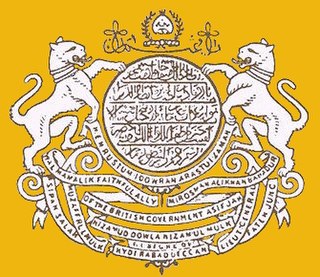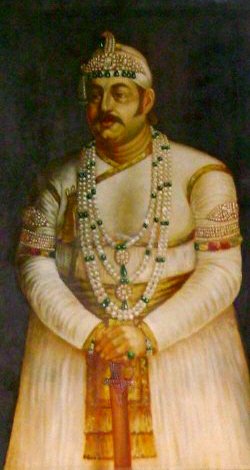
Osmania University is a collegiate public state university located in Hyderabad, Telangana, India. Mir Osman Ali Khan, the 7th Nizam of Hyderabad in 1918, He released a farman to establish OSMANIA UNIVERSITY on the day of 29 August 1917. It is the third oldest university in southern India, and the first to be established in the erstwhile Kingdom of Hyderabad. It was the first Indian university to have Urdu as a medium of instruction — but with English as a compulsory subject. As of 2012, the university hosts 3,700 international students from more than 80 nations.

Hyderabad State was a princely state located in the south-central Deccan region of India with its capital at the city of Hyderabad. It is now divided into the present-day state of Telangana, the Kalyana-Karnataka region of Karnataka, and the Marathwada region of Maharashtra in India.

The Nizams were the rulers of Hyderabad from the 18th through the 20th century. Nizam of Hyderabad was the title of the monarch of the Hyderabad State. Nizam, shortened from Nizam-ul-Mulk, meaning Administrator of the Realm, was the title inherited by Asaf Jah I. He was the former Naib (suzerain) of the Great Mughal in the Deccan, the premier courtier of Mughal India until 1724, the founding of an independent monarchy as the "Nizam of Hyderabad".

Asaf Jah VI, also known as, Sir Mir Mahboob Ali Khan Siddiqi Bayafandi was the 6th Nizam of Hyderabad. He ruled Hyderabad state, one of the Princely states in India between 1869 and 1911.

Mir Osman Ali Khan, Asaf Jah VII, was the last Nizam (ruler) of the Princely State of Hyderabad, the largest princely state in British India. He ascended the throne on 29 August 1911, at the age of 25 and ruled the Kingdom of Hyderabad between 1911 and 1948, until India annexed it. He was styled as His Exalted Highness-(H.E.H) the Nizam of Hyderabad, and was widely considered as one of the world's wealthiest person of all time. With some estimate placing his wealth at 2% of U.S. GDP, his portrait was on the cover of Time magazine in 1937. As a semi-autonomous monarch, he had his own mint, printing his own currency, the Hyderabadi rupee, and had a private treasury that was said to contain £100 million in gold and silver bullion, and a further £400 million of jewels. The major source of his wealth was the Golconda mines, the only supplier of diamonds in the world at that time. Among them was the Jacob Diamond, valued at some £50 million, and used by the Nizam as a paperweight.

Syed Mohammad Hadi was one of the most gifted pioneering athletes of India. He not only represented India in cricket and tennis, but was also proficient in field hockey, soccer, table tennis, chess, and polo. He was nicknamed "Rainbow Hadi" because of his expertise in these seven sports.

The Nizam College is a constituent college of Osmania University established in 1887 during the reign of Mir Mahbub Ali Khan, Asaf Jah VI, in Basheerbagh, Hyderabad, Telangana.

Jamia Nizamia more properly, Jami'ah Nizamiyyah, is one of the oldest Islamic seminaries of higher learning for Muslims located in Hyderabad, India. It is named after its founder- the 7th Nizam of Hyderabad.

Mir Farqunda Ali Khan commonly known as Nasir-ud-Daulah, was Nizam of Hyderabad, a princely state of British India, from 24 May 1829 until his death in 1857.

Afzal ad-Dawlah, Asaf Jah VMir Tahniyath Ali Khan Siddiqi was the ruling Nizam of Hyderabad, India, from 1857 to 1869.

Sir Mir Turab Ali Khan, Salar Jung I,, known simply as Salar Jung I, was an Indian nobleman who served as Prime Minister of Hyderabad State between 1853 until his death in 1883. He also served as regent for the sixth Nizam, Asaf Jah VI between 1869 and 1883.

Syed Sir Ross Masood bin Mahmood Khan, was the Vice-Chancellor of Aligarh Muslim University starting in 1929.
Nawab Syed Hussain Bilgrami, Imad-ul-Mulk Bahadur, CSI (1842-1926) was an Indian civil servant, politician, educationalist and an early leader of the All India Muslim League.

The Asaf Jahi was a Muslim dynasty that ruled the Hyderabad State. The family came to India in the late 17th century and became employees of the Mughal Empire. They were great patrons of Persian culture, language, and literature, the family found a ready patronage.
Nawab Mir Akbar Ali Khan was governor of Uttar Pradesh in India from 1972 to 1974 and governor of Odisha from 25 October 1974 to 17 April 1976. He was a member of the Rajya Sabha for 18 years and he was deputy chairperson of the Rajya Sabha for 12 years. He was associated with Osmania University and was a member of the Senates of Aligarh Muslim University, Jamia Millia Islamia and Jawaharlal Nehru University. Later in 1957 he founded a Polytechnic in Hyderabad.

The Anglo Arabic Senior Secondary School or more commonly, Anglo Arabic School, is a co-educational government aided school in New Delhi, India. The school is managed by Delhi Education Society. Prof. Najma Akhtar is the president of the School Managing Committee and Prof. Mohd Muslim Khan is the manager of the school. It was founded in 1696 by Ghazi ud-Din Khan Feroze Jung I.
The Aligarh Movement was the push to establish a modern system of Western–style scientific education for the Muslim population of British India, during the later decades of the 19th century. The movement's name derives from the fact that its core and origins lay in the city of Aligarh in Northern India and, in particular, with the foundation of the Muhammadan Anglo-Oriental College in 1875. The founder of the oriental college, and the other educational institutions that developed from it, was Sir Syed Ahmed Khan. He became the leading light of the wider Aligarh Movement.
Zubaida Yazdani was an Indian historian specializing in the history of the Deccan Plateau and the Nizam State of Hyderabad in India. She studied History at Oxford and was a contemporary of Mrs Indira Gandhi, Prime Minister of India.
Saeed Ahmad Akbarabadi was an Indian Islamic scholar and an Urdu-language author who co-founded the Nadwatul Musannifeen. He served as the Dean of the Faculty of Theology in Aligarh Muslim University.












